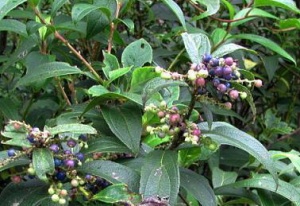Difference between revisions of "Wintergreen"
(→Special Precautions of Wintergreen) |
(→Special Precautions of Wintergreen) |
||
| Line 2: | Line 2: | ||
Other Names: Boxberry, Canada Tea, Checkerberry, Deerberry, Essence de Gaulthérie, Gaulteria, Gaultheria Oil, Gaultheria procumbens, Gaulthérie Couchée, Gaultheria fragrantissima, Gandapura, Gandapuro, Gandhapura Taila, Ground Berry, Hilberry, Huile de Thé des Bois, Mountain Tea, Oil of Wintergreen, Partridge Berry, Petit Thé, Petit Thé des Bois, Spiceberry, Teaberry, Thé de Montagne, Thé de Terre-Neuve, Thé du Canada, Thé Rouge, Thé des Bois, Wax Cluster.<br>Wintergreen is an herb. Wintergreen oil is made by steam processing of warmed, water-soaked wintergreen leaves. The leaves and oil are used to make medicine. | Other Names: Boxberry, Canada Tea, Checkerberry, Deerberry, Essence de Gaulthérie, Gaulteria, Gaultheria Oil, Gaultheria procumbens, Gaulthérie Couchée, Gaultheria fragrantissima, Gandapura, Gandapuro, Gandhapura Taila, Ground Berry, Hilberry, Huile de Thé des Bois, Mountain Tea, Oil of Wintergreen, Partridge Berry, Petit Thé, Petit Thé des Bois, Spiceberry, Teaberry, Thé de Montagne, Thé de Terre-Neuve, Thé du Canada, Thé Rouge, Thé des Bois, Wax Cluster.<br>Wintergreen is an herb. Wintergreen oil is made by steam processing of warmed, water-soaked wintergreen leaves. The leaves and oil are used to make medicine. | ||
==Special Precautions of Wintergreen== | ==Special Precautions of Wintergreen== | ||
| + | * Never use Gultharia essential oil internally and always ensure that you use this oil in a diluted form for topical application | ||
*The oil is UNSAFE to take by mouth. Taking wintergreen oil or large amounts of wintergreen leaf can cause ringing in the ears, nausea, vomiting, diarrhea, headache, stomach pain, and confusion. | *The oil is UNSAFE to take by mouth. Taking wintergreen oil or large amounts of wintergreen leaf can cause ringing in the ears, nausea, vomiting, diarrhea, headache, stomach pain, and confusion. | ||
*When applied directly to the skin, wintergreen oil can cause skin irritation. | *When applied directly to the skin, wintergreen oil can cause skin irritation. | ||
Revision as of 05:38, 20 November 2016
Other Names: Boxberry, Canada Tea, Checkerberry, Deerberry, Essence de Gaulthérie, Gaulteria, Gaultheria Oil, Gaultheria procumbens, Gaulthérie Couchée, Gaultheria fragrantissima, Gandapura, Gandapuro, Gandhapura Taila, Ground Berry, Hilberry, Huile de Thé des Bois, Mountain Tea, Oil of Wintergreen, Partridge Berry, Petit Thé, Petit Thé des Bois, Spiceberry, Teaberry, Thé de Montagne, Thé de Terre-Neuve, Thé du Canada, Thé Rouge, Thé des Bois, Wax Cluster.
Wintergreen is an herb. Wintergreen oil is made by steam processing of warmed, water-soaked wintergreen leaves. The leaves and oil are used to make medicine.
Special Precautions of Wintergreen
- Never use Gultharia essential oil internally and always ensure that you use this oil in a diluted form for topical application
- The oil is UNSAFE to take by mouth. Taking wintergreen oil or large amounts of wintergreen leaf can cause ringing in the ears, nausea, vomiting, diarrhea, headache, stomach pain, and confusion.
- When applied directly to the skin, wintergreen oil can cause skin irritation.
- Children: Wintergreen leaf and oil can be poisonous for children. Taking 4-10 mL of wintergreen oil by mouth can be deadly. Don’t even use wintergreen oil on the skin of children less than 2 years old.
- Pregnancy and breast-feeding: Wintergreen is safe in amounts found in food, but there's not enough information to know if it's safe in the larger amounts that are used as medicine. Don’t take it by mouth or put it on your skin, if you are pregnant.
- If you are breast-feeding, don’t take wintergreen by mouth or put it on your skin. Wintergreen products might be toxic to nursing infants.
- Stomach and intestinal inflammation: Taking wintergreen by mouth might make these conditions worse.
- Salicylate or aspirinallergy, asthma, or nasal polyps: Wintergreen might cause an allergic reaction in people who are allergic to aspirin or other salicylate compounds, or have asthma or nasal polyps. Use wintergreen with caution if you have one of these conditions.
- Warfarin (Coumadin) interacts with Wintergreen
- Aspirin interacts with Wintergreen
Benefits and uses of Wintergreen are
Wintergreen leaf contains methyl salicylate : an aspirin-like chemical that might reduce pain, swelling, and fever. Celebrated as Gandapura in Ayurveda, Gultharia has been an important Ayurvedic remedy for relieving joint pain, muscular spasms, sprains, rheumatism, inflammation and for healing wounds.
- The essential oil of Indian Winter Green has anti-inflammatory and antispasmodic properties,
- Helps alleviate the pain associated with joint ache and rheumatism
- Arthritis.
- Menstrual cramps.
- Achy joints (rheumatism).
- Headache.
- Minor aches and pains.
- Stomachache.
- Gas (flatulence).
- Fever.
- Kidney problems.
- Asthma
- Nerve pain
- Gout
Uses in Patent Medicine
- Die Da Zhi Tong Gao
- Rumalaya gel
- Pain Balm
- Rumalaya liniment
